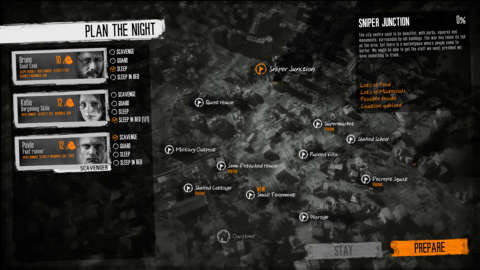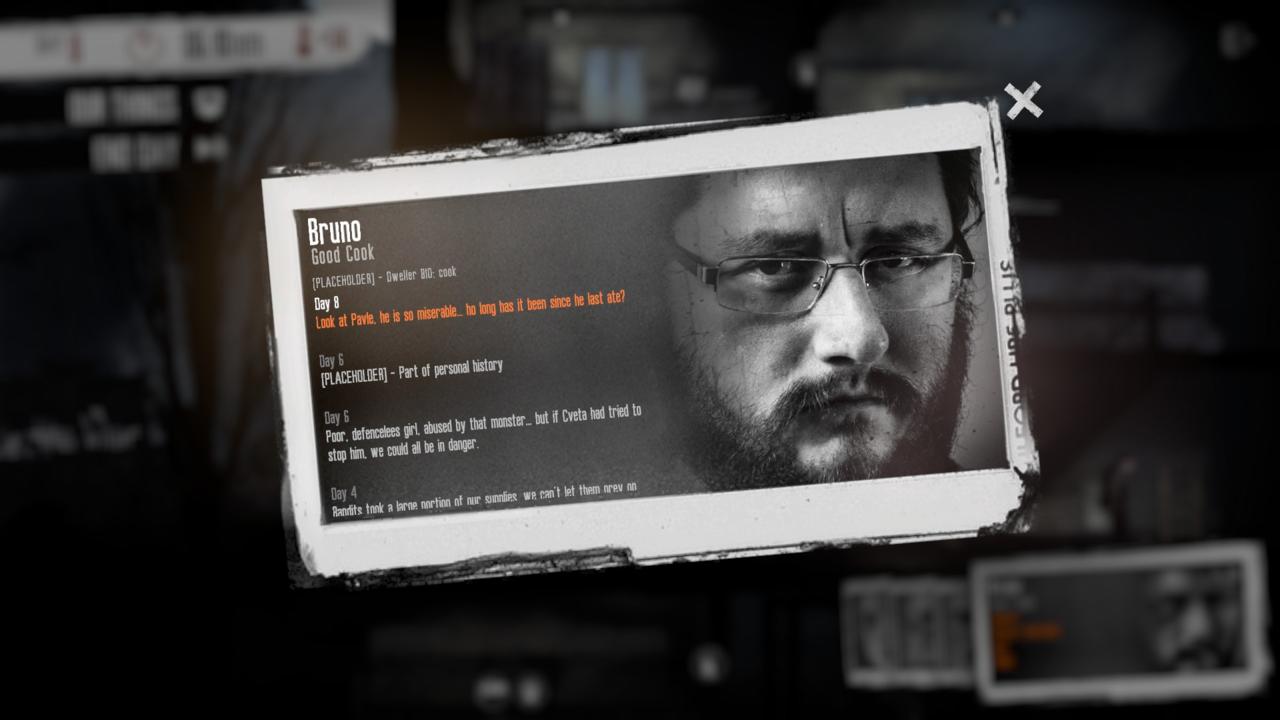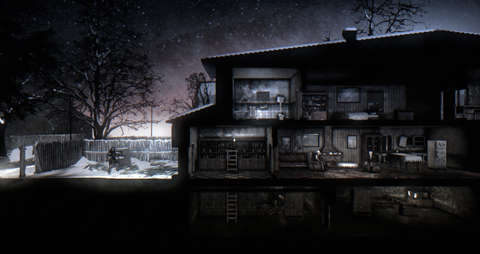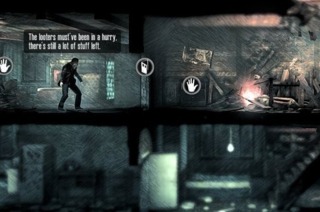An hour into This War of Mine, I keep thinking about that bit in The Last of Us where someone was somehow clear-headed enough in the middle of a war zone to scrawl "What happens when the food runs out?" on a concrete wall on a backed-up highway. It's a meaningless bit of background detail there. Here, it’s an all-consuming, panic attack-inducing source of primal fear.
It's not a question a game about war ever asks, and when it shows the answer, it's never in as much emotional detail as it’s shown here. Even in a game like Spec Ops: The Line, which aims to measure the toll on the people fighting a war for too long, it's not a question you need to address, because there's only one way you can ever interact with the people in front of your gun. When the soldiers are miles away, when the smoke clears, and every home harbors the ghosts of innocent bystanders, how long do you have before basic humanity is nothing but background noise compared to the constant roar of a hungry belly?

My own answer to that question came about 12 days into This War of Mine. All legitimate avenues for obtaining foodstuffs--through barter, scavenging bombed-out ruins, trapping animals--had been exhausted. Our only weapons are a crowbar and a knife, which I left with the person whom I told to stand guard overnight at home. The only option that didn't involve surely taking a bullet involved entering a relatively untouched suburb. There was no security, but you're told there's plenty of food and supplies there… provided you're willing to steal them. With no other viable alternatives, I went. An old man opened the door, telling me his wife is sick, and they cannot share. He stood there, chastising my silent character. And I then had to weigh my group's survival versus terrorizing an old couple's home.
Four hours later, I returned home with enough supplies to eat for a week straight.
A week and a half later, my scavenger still hadn’t forgiven himself.


Remorse is actually a tangible, ugly thing to visit upon the survivors in This War of Mine. Remorse causes characters to move slower, hang their heads, decide not to perform simple tasks due to the pointlessness of it all. Your friends at home may feel overwhelming guilt about using stolen goods. And left unchecked, such guilt can fester into crippling depression and, worse, lead to suicide. And it's one of the more gut-wrenching ways your little settlement can fall to pieces--though there are also far more obvious ways. like getting shot, stabbed, beaten, and, of course, starving to death. Your job, as player, is to fight the good fight, but not against military bullets and bombs, or an invading army; you instead have to maintain everything else that's left in the ashes of their wake.
What follows is an oppressively somber 2.5D version of The Sims, rendered in a beautiful, but portentous, constantly moving pencil art style. You start with three survivors who have taken shelter in a dilapidated three-story house: two childhood friends, and a displaced TV chef who just happened to be in the wrong place at the wrong time. The game doesn't give you a tutorial on how to use anything, but it's simple enough to suss out after only a few minutes. By day, food and shelter must be meticulously prepared, and the convenient tools of modern living we all take for granted are now scarce or need to be built completely from scratch. By night, new supplies must be scavenged from the surrounding areas while you pray no one had the same idea about looting your place. Thankfully, the game doesn't go for complete realism, i.e. you never have to wonder why an ex-football player knows how to build a full kitchen range out of a box of random crap and a wooden plank. Your supplies are kept under simple headings like "electronics," "fuel," and "parts," and as long as you have enough of them, you can run to your workbench and craft anything you need at will, from creature comforts like chairs and beds, to simple survival tools like small animal traps and rainwater collectors; you can also do more complex stuff like fixing broken guns and armor.
The trick, of course, is actually having the resources or even the energy for any of that. When you start the game, all of your survivors are starving, one is wounded, and one is sick. Tending to them is the top priority, so you have to scrounge around the house first for enough materials to build beds, or find food, or build a crude stove. But what if you run out of materials early? Who gets to sleep in a bed instead of on the floor? Who gets to eat tonight? Is someone sick or wounded enough to warrant spending the resources on meds instead of a shovel to dig out debris? Later on, this gives way to bigger concerns, such as whether your housemates harbor resentment for something you did while scavenging the previous night, or whether they’ll sink into depression due to scraping by on raw food, with no distractions or simple pleasures like books, coffee, moonshine, or cigarettes. How is a character going to react if you have to burn the last book in the house to heat the place for another night?

And so, you scavenge. You can visit a single location every night, with a helpful screen telling you the current situation around the place, rumors you've heard, and what could be contained inside, and you can then search around for anything that might be of use. Some nights, especially early on, you get lucky, and the chosen location is completely abandoned, meaning you can take your time, keep tabs on what your house needs, and walk away with enough food and supplies for a few days, as well as enough resources to make serious improvements. And then come the times when you run into other people.
Interactions with other people can go all sorts of ways here. My first encounter with another person was at a supermarket--a gun-wielding man with a bandana over his face, telling his people what to look for. When he turns and sees me, there's a moment of dread where I don't know how, or even if, I should take a swing before he pulls the trigger. To my complete relief, he says there's plenty for everyone, and to feel free to explore. He and his people completely leave me to my own devices the whole night. There are occasional surprises like this in This War of Mine, where your faith in other people is rewarded. People remember when you're good to them, and come to your aid when you least expect it. People randomly share what they have if you do the same. More than once, a couple living a few doors down came by with vegetables right when things were looking their darkest, thanks to sending someone to help clear the debris in their home a few days before.
But of course, there's the other side of things. Late in my first playthrough, I happened upon a woman trying to barter for supplies from a soldier, who ends up asking for sexual favors in return. Unfortunately, the game's simple nature gets in the way, here. There's no way to knock, or sneak up behind someone, or even grab a chunk of rock to throw. So, when it becomes obvious this isn't going to go well, I barge in, crowbar in hand. I'm promptly shot dead for my efforts.

It's that moment that tended to define my interactions with people afterward. If I'm desperate enough to steal, I'm desperate enough to shoot/strike first and ask no questions later. New survivors would come to my door, asking for a place to stay, and for a while, I kept wondering if they were dangerous and, more importantly, did I really have the ability to support another hungry mouth? In playthroughs that reached later in the month, the answer was increasingly, heartbreakingly "no."

Even when the answer was “yes,” at times when my house legitimately flourished without the need to harm another soul--as much as it could flourish anyway--the biggest problem then came down to sheer boredom. The tedium of living day by day, carefully scraping for supplies, creating a house routine, listening to the radio and praying for a booming "THE WAR IS OVER!" announcement that never comes, it starts to bear down on you more than even seeing housemates get attacked or killed. Even in relative prosperity, you're still stuck in this place every day in a non-stop holding pattern, until, indeed, the food runs out.
And that's perhaps the ultimate point of This War of Mine: It doesn't stop. Survival when you're so disconnected from the things that right now make us full, happy, and human is monotonous. It's boring, and sad, and ongoing. For my part, I had a constant vision in my head that the events of a random Call of Duty were taking place just beyond the northern reaches of the map, and despite having that constantly in mind, in the moment, how many terrorists were being eliminated with extreme prejudice didn't matter. A helicopter rescue was always going to be there for those guys, taking them back to home base. There's no such rescue coming for my survivors. The achievements, and dudebro camaraderie seemed especially silly then, when I hadn’t been able to provide a hot meal for someone in three days and he was rocking himself to sleep in a corner because his best friend got shot last night, all because we needed to build someone a heater for when it got cold.
Is this a game you want to play? No. Is it a game anyone with a beating heart should play? Yes. A million times yes. It's a longform exercise in empathy, a sobering piece of work that fills in the blanks left when all we see of war are the headshots. It's a much-needed course correct in the current shoot-first-ask-questions-never gaming landscape that supposes war is won because one supreme badguy caught a bullet through his brainstem. No: It's won when the people who lived under his boot get to go home.